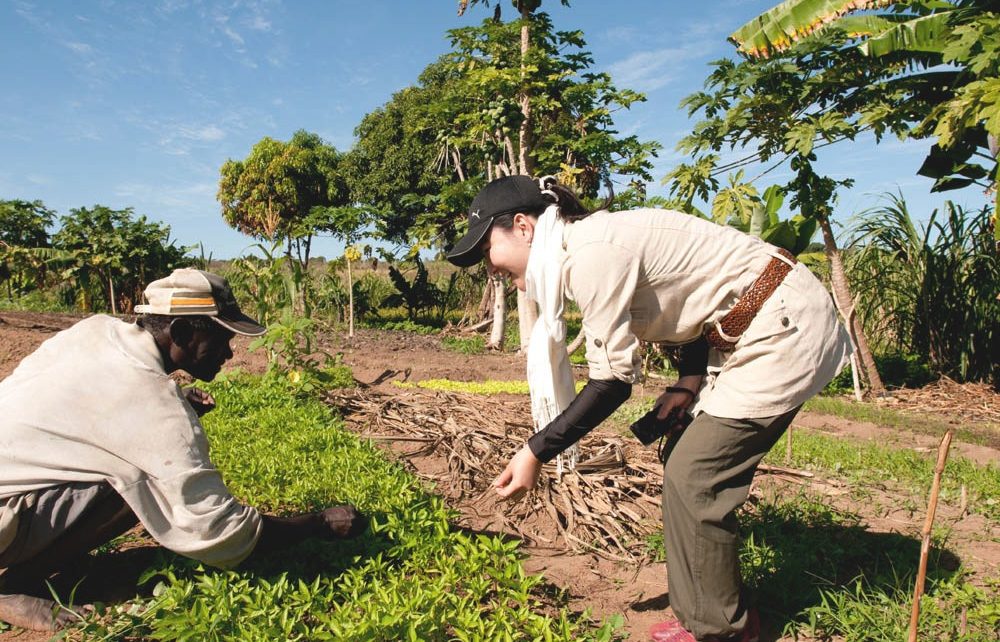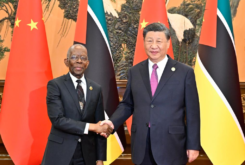Japan’s agricultural cooperation project in northern Mozambique, ProSavana, has come under increased scrutiny and criticism, due to the forceful tactics used to vanquish opposition by local civil society. But even as new embarrassing details emerge on the nature of lobbying activities, the Japanese government has decided to push forward with the Nacala Economic Corridor Development Programme.
Launched over 10 years ago, in September 2009, ProSavana initially involved Japan, Brazil and Mozambique. In a recent study of the programme, researcher Sayaka Funada-Classen (PRIME, Meiji Gakuin University), says the programme was launched at a “time when the economic presence of China began to expand internationally, especially in Africa,” and “for Japan, the rise of China was perceived as a threat due to their historical rivalry.”
“The competition with China led Japan to expand its foreign assistance to Africa and plan large-scale aid programmes in order to show its capacity as an innovative and leading traditional donor and gain support from African governments at the UN level. ProSavana was one such programme and it seemed to be positively regarded in diplomatic circles.”
The project aimed to transfer the success of Japan’s agricultural cooperation in the Brazilian Cerrado to the African savannah, combining the efforts of the Japan International Cooperation Agency (JICA) and its counterpart, the Brazilian Cooperation Agency (ABC). The parties aimed to promote soy cultivation.
The motivation for Tokyo to promote such a large-scale project has been not only to secure its food imports, but also to utilise it as an innovative and pioneer example of “South-South” and triangular cooperation aimed at elevating Japan’s presence in the field of international cooperation and diplomacy.
The initial project aimed to collect US$2 billion from global investors (including those in Japan) for the initial phase of developing 356,000 hectares – eventually expanding to 14 million hectares – in the region along the Nacala Corridor, the ProSavana target area.
According to Funada-Classen, the project had a “positive momentum” until September 2012, as concerning information shared at JICA seminars began to leak out. Then in October, the largest peasant movement in Mozambique, UNAC, released a statement in clear opposition to ProSavana. They criticised the agricultural development model led by Japan in the 1980s in Brazil and claimed large-scale land grabbing would take place in the target area.
At the Tokyo International Conference on African Development (TICAD) in 2013, representatives of Mozambican civil society, led by then-UNAC President Augusto Mafigo, handed an open letter to Japanese Prime Minister Shinzo Abe, demanding the three countries to stop ProSavana immediately. The letter was signed by 23 Mozambican organisations and networks and 43 international organisations and social movements, including some in Japan and Brazil.
UNAC then announced their own conference on ProSavana, to be held in August 2013, prompting JICA Mozambique to contract Portuguese consulting firm CV&A for the second time. Signed 1 August 2013, the contract was to formulate a “Communication Strategy,” later revealed in a series of disclosure requests issued under the Information Disclosure Law. Consultants were expected to develop a strategy but also prepare and organise programmes and articles for national TV, radio and newspapers.
The report, says Funada-Classen, “shocked almost all the people who had access to it.” The ‘Communication Strategy’ was full of recommendations about how to divide: the peasant associations opposed to ProSavana from local communities; the Mozambican organisations from international organisations including those of Japan and Brazil; and the Mozambican organisations opposed to ProSavana from national media. For materialising the above goals, CV&A proposed using the Mozambican government to identify ‘District Collaborators’ in each of the 19 target districts to act as extensions of ProSavana.
Another disturbing passage stated that “if [local NGOs] influence persists, the following is advised … questioning or criticising (foster criticism by some Mozambican authorities) the role that foreign organisations are playing in Mozambique.”
Senior officials did just that: in early August, Mozambican Agriculture Minister José Pacheco and the Provincial Agriculture Director of Nampula Pedro Dzucula were already referring to the NGOs’ drive as a “conspiracy” fomented abroad.
By the end of 2013, according to the researcher, “the Brazilians seemed to have lost their interest in ProSavana, but this did not mean the end of their involvement with agribusiness or other business along the Nacala Corridor region.” A year later, 35 land deals were made targeting the Nacala Corridor region, 11 of which were for producing soy. The massive tree plantation projects that were already expanding in Niassa Province “took faster pace.”
That year also saw a series of public hearings take place in Mozambique, but instead of peasant participants, most were Frelimo party members and traditional authorities or ‘régulos’. Observers described the hearings as “like an election rally”; some even began with the Frelimo song “Viva Frelimo.” JICA brushed aside criticism of the hearings, insisting that the problems occurred because the Mozambican government is “inexperienced with democracy and public hearings.”
By June 2015, five different and critical statements from over 30 organisations were issued against the hearings. This, along with the announcement of an official visit to Japan by the delegation of UNAC and the ‘No to ProSavana’ campaign, prompted a “change of course” from JICA.
JICA hired another consulting company, MAJOL, in 2015, a fact which they denied at the time. Unknown persons leaked the three reports prepared by MAJOL in April 2016, exposing detailed profiling of relevant players assessing both their power and relative openness to cooperation with ProSavana.
A central figure in the contract, Peter H Bechtel, a coordinator for Northern Mozambique of WWF and is a businessman engaging in tourism and agribusiness in the same region, helped JICA gain access to civil society organisations and their donor organisations, strengthening their position in the region.
Under MAJOL’s guidance, a platform of NGOs sympathetic to ProSavana, Civil Society Coordination Mechanism (MCSC), was formed. But efforts to include UNAC were unsuccessful, a “worst-case scenario” for JICA.
When the CV&A and other consultancy contracts came to light, the Japanese Ministry of Foreign Affairs (MOFA) general director, Takio Yamada, issued a decisive judgement to end them. JICA, however, “did not accept its failure and manipulated the objection inspection procedure.” On 1 November 2017, an investigation report was released, concluding “JICA cannot be found to have committed violations of the Guidelines as alleged by the requesters.”
The Japanese government later ruled that the ProSavana Master Plan “cannot be finalised with Japanese money, as was previously authorised, unless the opposition groups, such as UNAC and the organisations of the ‘No to ProSavana’ campaign, participate in the discussions regarding the plan and agree with the process.” Despite the victory for NGOs, says Funada-Classen, “the programme has not disappeared and in reality, it continues, though differently.”
In 2018, the Administrative Court in Maputo unanimously agreed with all the claims against the ProSavana Coordination Unit of MASA (Ministry of Agriculture and Food Security) made by the Mozambican Bar Association.
Yet that year, JICA announced financing of US$14 million to “pilot projects” under the project, for 4,800 local farmers with MOFA’s support. This despite continually stressing that ProSavana was still in the investigation and research phrase, a contradiction that officials struggled to explain.
Japanese economic interests are deliberately concentrated in Northern Mozambique and not limited to the region along the Nacala Corridor. JICA is also targeting natural gas in Cabo Delgado province in the greater economic corridor of Nacala. Mitsui, together with the government-funded JOGMEG, is the second biggest shareholder (20%), of the Rovuma Offshore Area 1 Block concession.
“While JICA and MOFA keep using their tactics of divide and rule and trying to wear out the civil societies of the three countries, Mitsui, JBIC and MOF [two Mitsui financiers] have gone ahead with the original ProSavana plan by advancing the Nacala Economic Corridor Development Programme with their Brazilian partner, Vale,” says Funada-Classen.
Mitsui, the biggest Japanese trading company, established a ‘strategic partnership’ with Vale in the early 2000s. It designated board members to the company and purchased shares in Vale’s Moatize Coal Mine (15%) and Vale’s Mozambican company managing the Nacala railway and port (50%). In 2017, Mitsui received a total of US$3 billion as a loan from JBIC, Japanese commercial banks and African Development Bank. “This turned out to be the first and biggest Japanese public-private investment happening in Sub-Saharan Africa,” says the researcher.
“Thus, Japan’s ambition of securing its grip on the Nacala Corridor region and turning it into a centre of commodity production for the Asian market with the Brazilian counterpart did not cease no matter how strong the local resistance was. As long as the ‘value-chain’ route enabling and facilitating the controlled commodity transportation and exportation by the Japanese-Brazilian actors could be established, private actors will do the rest,” adds Funada-Classen.




